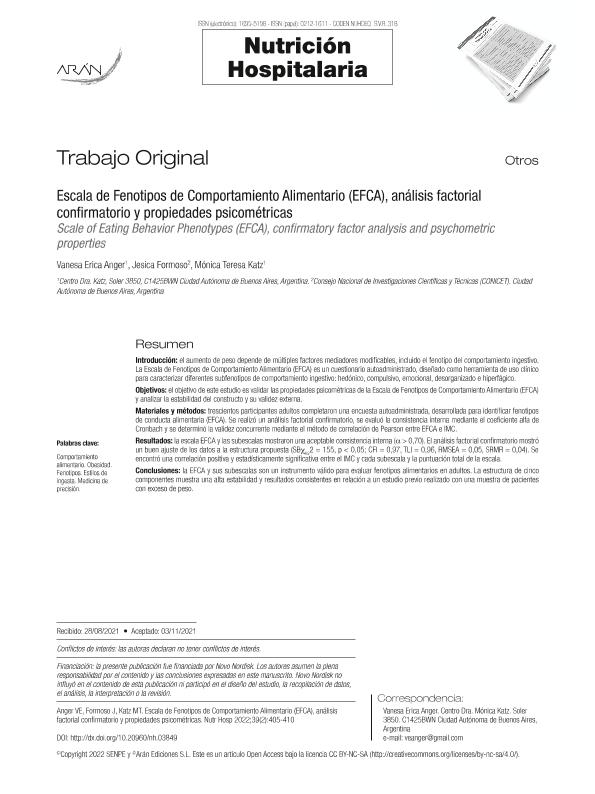Artículo
Introducción: el aumento de peso depende de múltiples factores mediadores modificables, incluido el fenotipo del comportamiento ingestivo. La Escala de Fenotipos de Comportamiento Alimentario (EFCA) es un cuestionario autoadministrado, diseñado como herramienta de uso clínico para caracterizar diferentes subfenotipos de comportamiento ingestivo: hedónico, compulsivo, emocional, desorganizado e hiperfágico. Objetivos: el objetivo de este estudio es validar las propiedades psicométricas de la Escala de Fenotipos de Comportamiento Alimentario (EFCA) y analizar la estabilidad del constructo y su validez externa. Materiales y métodos: trescientos participantes adultos completaron una encuesta autoadministrada, desarrollada para identificar fenotipos de conducta alimentaria (EFCA). Se realizó un análisis factorial confirmatorio, se evaluó la consistencia interna mediante el coeficiente alfa de Cronbach y se determinó la validez concurrente mediante el método de correlación de Pearson entre EFCA e IMC. Resultados: la escala EFCA y las subescalas mostraron una aceptable consistencia interna (α > 0,70). El análisis factorial confirmatorio mostró un buen ajuste de los datos a la estructura propuesta (SBχ922 = 155, p < 0,05; CFI = 0,97, TLI = 0,96, RMSEA = 0,05, SRMR = 0,04). Se encontró una correlación positiva y estadísticamente significativa entre el IMC y cada subescala y la puntuación total de la escala. Conclusiones: la EFCA y sus subescalas son un instrumento válido para evaluar fenotipos alimentarios en adultos. La estructura de cinco componentes muestra una alta estabilidad y resultados consistentes en relación a un estudio previo realizado con una muestra de pacientes con exceso de peso. Introduction: weight gain depends on multiple modifiable mediating factors, including ingestive behavior phenotype. The Eating Behavior Phenotypes Scale (EFCA) is a self-administered questionnaire designed as a tool for clinical use to characterize different sub-phenotypes of ingestive behavior: hedonic, compulsive, emotional grazing, disorganized and hyperphagic. Objectives: the aim of this study is to validate the psychometric properties of the Eating Behavior Phenotypes Scale (EFCA), to analyze the stability of the construct and its external validity. Materials and methods: three hundred adult participants completed a self-administered survey developed to identify eating behavior phenotypes (EFCA). A confirmatory factor analysis was performed, internal consistency was evaluated using Cronbach’s alpha coefficient, and concurrent validity was assessed using Pearson’s correlation method between EFCA and BMI. Results: the EFCA scale and the subscales showed an acceptable internal consistency (α > 0.70). The confirmatory factor analysis showed a good adjustment of the data to the proposed structure (SBχ92 2 = 155, p < 0.05; CFI = 0.97; TLI = 0.96; RMSEA = 0.05; SRMR = 0.04). A positive and statistically significant correlation was found between BMI and both each subscale and total scale scores. Conclusions: EFCA and its subscales are a valid instrument to assess eating phenotypes in adults. The five-component structure shows high stability and consistent results in relation to a previous study carried out with a sample of obese patients.
Escala de Fenotipos de Comportamiento Alimentario (EFCA), análisis factorial confirmatorio y propiedades psicométricas
Título:
Scale of Eating Behavior Phenotypes (EFCA), confirmatory factor analysis and psychometric properties
Fecha de publicación:
03/2022
Editorial:
Aula Médica Ediciones
Revista:
Nutrición Hospitalaria
ISSN:
0212-1611
e-ISSN:
1699-5198
Idioma:
Español
Tipo de recurso:
Artículo publicado
Clasificación temática:
Resumen
Archivos asociados
Licencia
Identificadores
Colecciones
Articulos(SEDE CENTRAL)
Articulos de SEDE CENTRAL
Articulos de SEDE CENTRAL
Citación
Anger, Vanesa Erica; Formoso, Jesica; Katz, Mónica Teresa; Escala de Fenotipos de Comportamiento Alimentario (EFCA), análisis factorial confirmatorio y propiedades psicométricas; Aula Médica Ediciones; Nutrición Hospitalaria; 39; 2; 3-2022; 405-410
Compartir
Altmétricas




